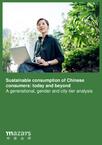
Sustainable consumption of Chinese consumers
Following the study "Chinese consumers in 2021: how priorities in lifestyle consumption are changing", we, once again, teamed up with Noblesse and four leading global brands, Hyatt, McLaren, Moët Hennessy Diageo (MHD) and Tiffany & Co., to examine Chinese consumers' perceptions and behaviours related to sustainability across different generations, genders and regions.
Based on data gathered in a 2023 survey, the report reveals how Chinese consumers perceive sustainability, the factors that influence their understanding, their level of awareness and how this impacts consumption, and their expectations towards brands both now and in the future.
Chinese consumers' definition of sustainability
More than 70% of Chinese consumers believe sustainability must include reducing pollution and optimising the living environment, which ranked first among all sustainability definitions, followed by promoting good health, and addressing wealth disparities to achieve common prosperity.
Awareness of sustainability and current behaviour
The survey found that most Chinese consumers actively seek information on brands' sustainability efforts, and are driven by a desire to contribute to sustainable development. The most popular sustainability concepts are environmental protection, carbon emission reduction, and animal protection.
Expectations for brands’ sustainable development
Consumers are influenced by brands that use environmentally friendly materials and recyclable packaging, reduce carbon emissions in manufacturing, and avoid harming animals. Conversely, brands causing pollution, harm to animals, or excessive packaging negatively impact purchasing decisions.
It is noteworthy that there is a shared expectation amongst Baby Boomers, Gen Xers, and Millennials for brands to implement recycling programmes. For Gen Z, it is important that brands promote diversity, and respect gender equality.
The future of sustainable consumption
Chinese consumers consider addressing income inequality and common prosperity as an urgent sustainable development issue in China. They plan to support sustainability through environmental protection, carbon reduction, energy conservation, and practising sustainable lifestyles. Additionally, alongside city-tier progression, the commitment to sustainable consumption grows among consumers.
The Chinese market is diverse and multifaceted, and both gender dynamics and the developmental status of cities in which consumers are located have a profound influence on their definition of sustainability.
Read our report to discover the latest trends in consumer spending, and learn what brands can do to keep up with these shifting priorities.
Contact







